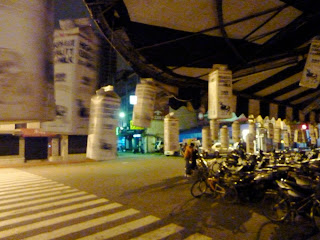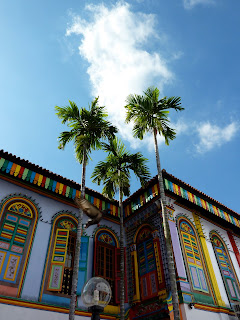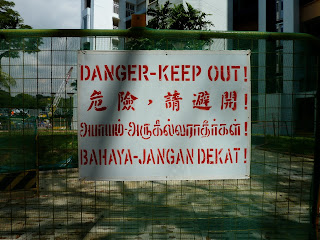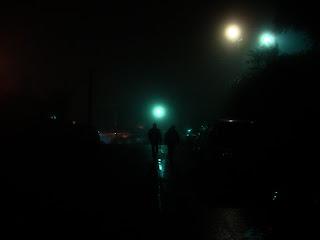











Jeffrey Hartsough
Final Report
ICLP 2009-2010 Academic Year
Because my blog sort of petered out at the beginning of the last quarter and I covered most of what needed to be covered about the first two quarters already, I’ll be focusing on the spring quarter in my final report.
Spring quarter was intense. I took four classes, reading an autobiography for my one-on-one, radio Chinese, modern Chinese history, and law and debate. The quality of instruction across the board was fantastic, as usual—I was continually impressed by the teachers’ breadth of knowledge, ability to explain vocabulary or grammar, and commitment to the students. They were all understanding and reasonable, doing their best to make our lives more manageable. Although that was difficult at times, to be honest.
Modern Chinese history was a solid class, and a great review class because I’ve already taken two classes covering the time period in the text we used. It was good to solidify my understanding of the people and events, nice to learn it in Chinese, and even better to read some of the primary texts in classical Chinese.
My one-on-one class was a great supplement to the modern Chinese history course, as the subject of the autobiography was born in the late 19th century, and was witness to and an example of many of the changes covered in the modern Chinese history text. The book was very well written with interesting language and I plan on finishing the reading this summer. The only problem with this course was that it was my last priority because my degree of preparation wouldn’t affect other students, which was a bit unfair to my teacher, but she understood, and it was a choice I had to make because of my other two classes.
My final two classes were both fantastic, but real time drains. I really invested a lot of time and effort in these classes, which was wonderful in that I got a lot out of them, learned a lot, improved, and had fun, but it also meant that my experience and time was defined in large part by those two classes. At times it was frustrating not being able to spend more time exploring the city, hanging out, making Taiwanese friends etc. and a couple of travel opportunities were missed because of the two classes, but in the end it was worth it—I gained a lot from the classes, and had a number of experiences that I may not get the chance to do again in the future. Also, that’s the reason I went to Taiwan in the first place.
The radio class was a lot of fun. The first unit was on radio news, which was a good introduction. We had to choose a topic, do research, do interviews, write a report, record it, edit it and splice in interviews we had done. It was a good way to begin to understand the editing program, how to go out and do interviews, and the general structure and medium of radio. My first news piece was on a photography exhibition by the NTU photography club, and the second was on a a group of universities announcing they would be opening up year-long exchanges to mainland students.
The second unit, a 30-minute radio program, was definitely more daunting than the 3+ minute news pieces. I chose to do it on stinky tofu, which was a great choice because it’s a famous Taiwanese dish, and allowed me to travel the city going to famous stinky tofu spots, five different night markets, and a famous tofu village in Taipei County, all in the sake of research. I now can honestly say that I love stinky tofu, and know more than you might believe about it. It was cool finding sound bits and tofu-related music and splicing them in with my interviews and own pre-written stuff. It was cool to get that done.
The third and final unit was also very cool, in which we had to read a novel and rewrite it as a radio play, then record and edit it. It was the first novel I’d ever read cover to cover in Chinese, which gave me a real sense of accomplishment, and since then I’ve read two others. Kind of like breaking the 4-minute mile I suppose. The rewriting process was long, as was the recording, but it was a lot of fun. We really enjoyed ourselves in the recording studio, and editing in the sound effects and such was cool too. A fantastically fun, if time-consuming course.
The final class I took was law and debate. What a class. To make a long story short, we essentially went from initially planning on having a simple debate with the NTU students on something like GMO crops or something, to attending a true national level debate tournament on the Taiwan-China Economic Cooperation Framework Agreement (ECFA), one of the hottest and most complicated topics to hit Taiwan in the last couple of years. It’s essentially a step towards an FTA with China, and so there are questions about the economic, political, and social advantages and disadvantages of signing.
Like all of my teammates, I could go into long detail about the benefits and concerns of both sides, but I’d rather not bore everyone. We learned the rules of Oregon-style debate, learned how to structure an argument, went over logical errors to look out for, watched video of other Chinese debates, learned how to cross-examine, and did hours after hours of research on ECFA, Taiwan’s economy, China’s economy, the WTO, China-Taiwan relations, Korea, ASEAN… the list goes on.
From the time we learned we’d be going to this debate, I, like my classmates, spent at least two-and-a-half hours each day, sometimes upwards of 10 hours preparing outside of class. It was a long and tiring process, but it also showed me how much one can learn and how much progress one can make if fully committed to a subject, and it was inspiring to see how committed out teacher, Fan Laoshi, was to us, she was always willing and supportive, truly a fantastic teacher and an even better person.
Come gameday, there were still more sources to be read, more angles to be considered, and more sleep to be had, but we had what we had and had to make do. Our “For” plan was pretty standard, and went well—we won both debates in which we played “For.” Our “Against” proposal was a bit radical, and that’s what we were counting on, as we’d spent many hours preparing it right up until the final moments. We argued for reunification as a better way of solving the problems Taiwan is facing, rather than simply arguing against signing ECFA. It was interesting to see everyone’s reactions, especially because the first team we ended up using it against was from the military college. One of the few topics that will really throw just about any Taiwanese for a loop, to one degree or another losing the ability to examine the topic from an unbiased perspective.
I definitely learned a lot from the debate process, especially from watching the other debaters and listening to the judges’ critiques, about logic, use of resources, analysis, and speaking. We got better each time, adjusted our plans, and by then end found ourselves in the semifinals. Third place at a national debate tournament in Chinese haha—quite the way to bring the year to a close. Clearly that wasn’t the real takeaway, but certainly pretty cool.
During the quarter I, along with a few other students, wrote and acted in a short play as part of the NTU arts festival, which was great fun. I also got to participate in a poetry-reading activity, for which I chose a poem by Tang-dynasty poet Liu yuxi (劉禹錫) which in English goes something like this:
In the distant cool of Bashan and its clear waters, I whiled away 23 years of time alone.
Remembering old friends I suddenly hear a flute’s melody pierce the silence, returning from long exile the sights of home have melted away.
A thousand sails pass by the sinking ship, endless saplings spring before the sickly tree.
Listening to the poem you sang for me today, for now I raise my wine and rouse my spirits.
And the Chinese, for those who are interested:
巴山楚水淒涼地,二十三年棄置身
懷舊空吟聞笛賦,到鄉翻似爛柯人
沈舟側畔千帆過,病樹前頭萬木春
今日聽君歌一曲,暫憑杯酒長精神
The key line in this one is the third, hinting at the continual passage of time and inexorable nature of change and rebirth. I love the positive and cyclical attitude towards end and renewal, looking forward and in the moment rather than back, and thought it was fitting for all of us as students of a foreign language nearing the completion of our time abroad.
My final few days in Taiwan after schoolwork was done with were bittersweet. It was wonderful to get to hang out with friends, both from ICLP and Taiwanese, go to night markets, ride my bike, got to KTV, have a couple nice dinners, and do the sorts of things that make Taiwan so awesome. To be honest I’d sort of lost sight of that in the heyday of the final quarter, so even though it was short and very condensed, it was great to get that at the end.
Those final few days made me realize that I not only had improved my Chinese while in Taiwan, but that I’d also created a life for myself. I was so worried about “creating” a “life” for myself in the beginning that I didn’t just let it happen, which I think was a mistake. I was too worried about what I wanted to do and what I wanted to avoid that nothing happened naturally in the beginning and so nothing really happened at all. In the end it was just about taking it all for what it is and trying to take advantage of the moment and maintain some semblance of balance.
Living in a studio not in the dorms had its ups and downs, but I think was a good decision in the end. My default option wasn’t to just hang out with ICLP students, which I did do on a regular basis, but I also got to have time and space to myself, meet a couple neighbors, actively seek out Taiwanese, and have a life away from ICLP. It was great being 5 minutes or so walking from ICLP too though, and having a TV in my room was great for learning a bit about Taiwan, both pop culture, history, economy, social issues, news, etc., and listening practice. I will definitely continue that when I get back home.
As for my goals set out at the beginning of the year, There are two that are worth reflecting on at this point. The first was to “become a resident of Taipei.” I think I successfully did this, but not in the way I thought—I didn’t cook at all (I definitely would have done more cooking for TAS had I stayed at Yale haha), and the language program did become the focus of my time in Taiwan. I got to know the city, Taiwan, and Taiwanese through my teachers, travelling, night markets, friends, and all that anways.
Most important was the connection through the language though—to know the culture and people through the marks left in the language. The language is a beautiful thing, and I’m more excited than ever to continue learning, as the more you know the more you realize how little you do. I definitely will continue to take Chinese in one form ore another when I get back to school, and am toying with the idea of maybe doing my senior thesis in Chinese. That would be an interesting, if challenging experience. I’ve only begun and there’s so much ore depth to come to grips with in this language.
The other main goal for my year was to bring my Chinese and English personalities together, which I think is hard to say, but I’ve definitely come a long ways, to the point that I’d say I’m comfortable with it. The two will never be exactly the same, but I will keep growing and each personality will continue influencing the other. They aren’t one, but speak “one language on unity,” taking account and aware of one another, living in “harmonious relation” with one another. And I don’t think they should become one—that would be strange and wrong, as language brings so much baggage with it, and each language brings with it a different logic, a different way of thinking.
As for a few quick suggestions for future fellows, I would say go to Taiwan. Taiwan gets marginalized in the international scene far too often, and it’s equally regrettable that the same happens in Chinese language learning. It’s a fantastic place with wonderful people, great travel opportunities, awesome food, and a generally different experience than the mainland but in the same language, which is a very interesting experience. ICLP has some of the best teachers and resources you will come by for Chinese. Try living off campus, it will be a good experience again different from other programs. Get language partners—my meetings and conversations with them were always great, covering a wide range of topics of various depth, stretching my language in ways that I wouldn’t have had the opportunity to otherwise. Have fun, and explore the city you’re in, there’s always a lot to discover, and there will always be more studying to be done, it’s not about memorizing every character every night. Balance is paramount. Also, keep up a blog, even if it’s just one simple paragraph and one photo every couple days, getting into a rhythm like that will make it much easier. I regret not doing that, and my journal writing was sporadic.
Finally I must thank the Light Fellowship for making this year possible. It is a fantastic program that is run impeccably, which gives us the opportunity to not only learn language, understand other cultures, travel, and develop skills that will help us in the future, but also values that will help us in the future. Acceptance, cooperation, humility, confidence, courage, faith, and humanity, are all things that the Light Fellowship helps us understand and gain to one degree or another. I really can’t thank the Fellowship enough.
I will try and get some other more interesting stuff up on here in the future, some funny stories, random adventures, etc., but for now, this concludes the official portion of my Light Fellowship blog.











































